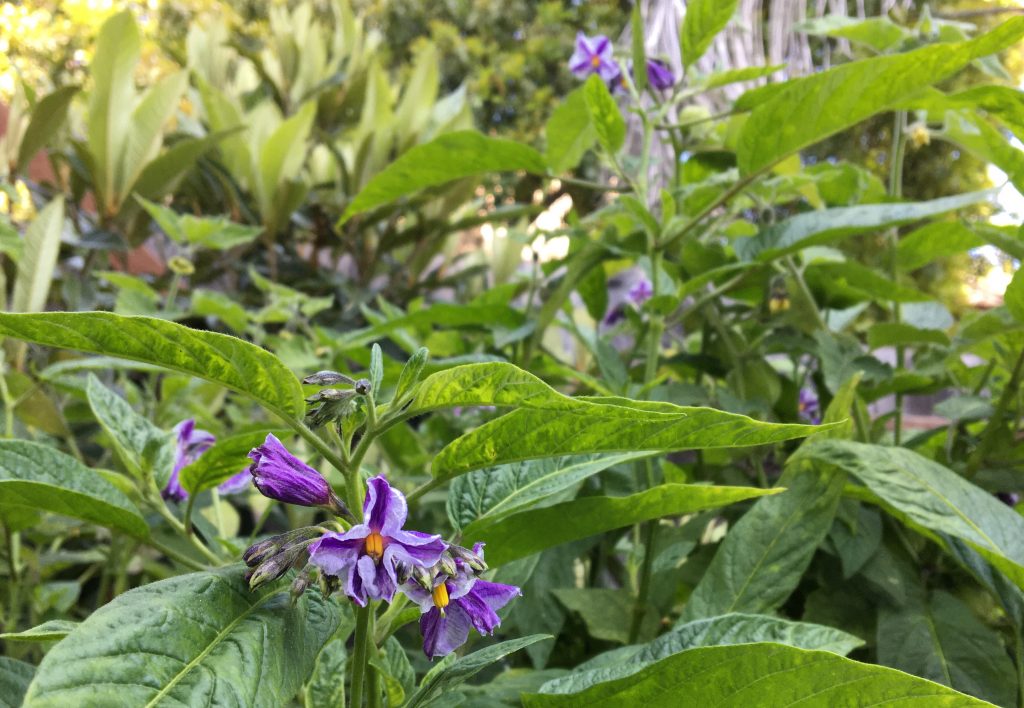Fruit Tree Guild Ideas
What is a fruit tree guild?
Fruit tree guilds are the practice of growing plants near fruit trees that thrive under similar conditions and support each other by making nutrients more available, attracting beneficial insects and pollinators, helping to break up the soil and improving drainage, suppressing weeds, deterring pests, and/or adding mulch. Diversity is encouraged in a fruit tree guild and ideally the plants will be added thoughtfully in the vicinity of the fruit trees and be useful in other ways to the people tending the guild. This concept is found in traditional farming practices in many cultures and also mimics the way that plants tend to grow in a natural setting in a healthy and diverse ecosystem.

Some types of plants that are beneficial to many fruit tree guilds are:
- Nitrogen fixers. Nitrogen is a macro-nutrient that all plants need to grow. Some plants have the ability (through a symbiotic relationship with bacteria in their roots) to ‘fix’ nitrogen in the soil and make it available to other plants. Annual nitrogen fixing plants can be chopped to the ground when they begin to flower, and that releases the nitrogen they have fixed into the soil for the plants around it. You can let some of these plants flower and go to seed so they will continue to grow in the following seasons. Some examples of annual nitrogen fixing plants are peas, lupines, beans, and clover. Some shrubs and trees like carob, ice cream bean, mesquite and goumi berry also have nitrogen fixing abilities.
- Pollinator plants. These are flowering plants that attract bees, butterflies, hummingbirds, etc. Some examples of pollinator plants are lavender, rock rose, yarrow, echinacea, flowering sage, borage, and calendula.
- Dynamic accumulators. These plants have deep tap roots that help break up the soil and improve drainage. They may have the ability to make micro-nutrients more available in the plants around them when used as a mulch or made into compost. Examples of these plants include yarrow, borage, comfrey, dandelion, and chicory.
- Weed suppressors. These plants grow in mat-like forms and help to out-compete weeds. Some examples of weed suppressors are prostrate rosemary, creeping sage, rock rose, pepino dulce, capers, golden berry (aka ground cherry), and yerba buena.
- Pest deterrents. Some plants have compounds that deter pests and others have qualities that attract beneficial insects (like lady bugs and green lacewings, that predate on other insects that hurt your plants). Some examples of these plants are rosemary, thyme, chives, echinacea, lemon balm, and yarrow. Using plants native to your area is also a good way to create habitat for beneficial insects.
- Mulch. Mulch helps to improve the soil by adding organic material and also helps to retain moisture. Some plants produce lots of organic matter, break down quickly and can be cut back frequently to create composts and mulch. Some examples of these plants are artichoke, comfrey, lemon balm, and borage.
Fruit tree guild examples
These fruit tree guild ideas work well in Mediterranean climates, such as those found here in California. Add your favorite fruit tree guilds or examples from your climate in the comments below!

Olive Guild
Olive trees, pomegranates, carob, capers, artichoke, culinary herbs (rosemary, sage, thyme, oregano, lavender), rock rose

Citrus Guild
Citrus (lemon, lime, orange, mandarin orange, kumquat, grapefruit), strawberry guava, pineapple guava, yarrow, lemon balm, borage, CA native lupines

Loquat guild
Loquat, pepino dulce, goumi berry, echinacea

Fig Guild
Figs, goji berry, strawberry, chives, comfrey, yarrow, CA native clover


White Sapote Guild
White sapote, passionfruit, ice cream bean, golden berry, flowering sage.
Contact us for more fruit tree guild ideas and edible landscaping advice!
